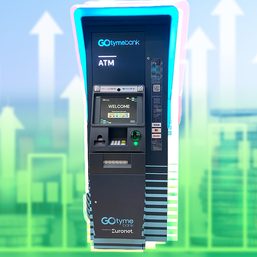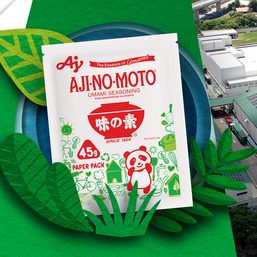SUMMARY
This is AI generated summarization, which may have errors. For context, always refer to the full article.

MANILA, Philippines – A plastic credit card isn’t exactly what comes to mind when you think of sustainability. But that could change as banks start to shift towards a greener outlook, with Security Bank among those leading the industry.
Traditionally, every new credit card is made from five grams of virgin plastic. And if you multiply that with the amount of credit cards in the country – around 11.8 million as of March 2023 – it comes out to 59 metric tons of plastic.
That’s the equivalent of 1.5 million plastic bottles. And remember, a credit card only has a lifespan of three years, meaning more cards issued and more plastic made every year. (READ: Philippines dominates global ocean plastic pollution chart at 36%, shows study)
Security Bank is hoping to buck that trend with its newly launched “sustainable” Wave Mastercard credit card. The Wave Mastercard is made from 100% recycled PVC waste as certified by the ICMA Ecolabel Standard.
“The Philippines is actually one of the top polluters of plastic waste, and most of our waste ends up really in the ocean. Now, as one of the largest retail banks in the Philippines, we are mindful of our plastic footprint as well, especially as regards to our credit card,” said Nikki Lizares, Security Bank’s sustainability head, during the card’s launch.
With their newly launched card, Security Bank is the first local bank to issue a credit card made of 100% recycled PVC. The cards are made by Idemia, one of the select card manufacturers that uses green materials and has complied with Mastercard’s stringent approval process.
Lizares, who has a background as an environmental scientist, told Rappler that the decision to shift to sustainable credit cards reflects the bank’s effort to “integrate sustainability principles into their operations.”
“One of our most material footprint is the credit cards, so it’s a small step, but it was significant because it’s really a big part of our business. When you say sustainability, it doesn’t just mean that we’re avoiding a certain kind of pollution,” Lizares told Rappler. “We want to change the ‘business as usual.’ Hopefully, this was a signal to shift into that new kind of normal.”
Security Bank is targeting to issue at least 8,000 new Wave Mastercards in 2024, which could increase in the following years, according to Security Bank’s unsecured lending head Christian Quiros. This is only a fraction of the bank’s total cards in force of nearly 507,000, but Security Bank could slowly transition more of its customers to its sustainable cards as they renew their cards after five years.
“We did some pencil pushing in terms of profitability. Of course, it’s more expensive than the usual plastic, but what’s important is we’re able to help the environment,” Quiros said. “Our direction is to continue it. Most probably, our next card that we launch will be on recycled [plastic] again.”
How about other banks?
Before Security Bank launched its new card, other banks had also began going green with their retail operations.
Earlier in 2021, Zalora and RCBC Bankard teamed up to issue a co-branded credit card made from “84% bio-sourced polylactic acid from non-edible corn,” which they claimed made it the first “eco-friendly credit card in the Philippines.” HSBC also touted that its Premier Visa Debit Card is now made of 85% recycled PVC.
But beyond Security Bank and others with a relatively small footprint in local retail banking, most major players have yet to cut down on the plastics used for their cards.
Although both the Bangko Sentral ng Pilipinas (BSP) and Credit Card Association of the Philippines (CCAP) have urged banks to start making their cards more sustainable, there are no hard rules or regulations enforced on the industry. In fact, when Rappler asked whether they had any list of credit card issuers using recycled plastic materials, both the BSP and CCAP said they had none.
Still, in recent years, banks have begun to think more sustainably when evaluating their loan books. For instance, RCBC has pledged to cut all its loans to coal plants by 2031 while Security Bank has also promised to exit from direct financing of coal plants by 2033. As banks begin to shy away from funding dirty fossil fuel projects, the hope is that they will now dole out loans to businesses blooming in the renewable energy industry.
“It’s a first step,” Lizares told Rappler. “We want to help these clients to transition to the low carbon economy.” – Rappler.com
Add a comment
How does this make you feel?



![[Finterest] Private banking: How the wealthy keep the money within the family](https://www.rappler.com/tachyon/2024/07/Finterest-wealth-between-the-family.jpg?resize=257%2C257&crop=425px%2C0px%2C1080px%2C1080px)





There are no comments yet. Add your comment to start the conversation.